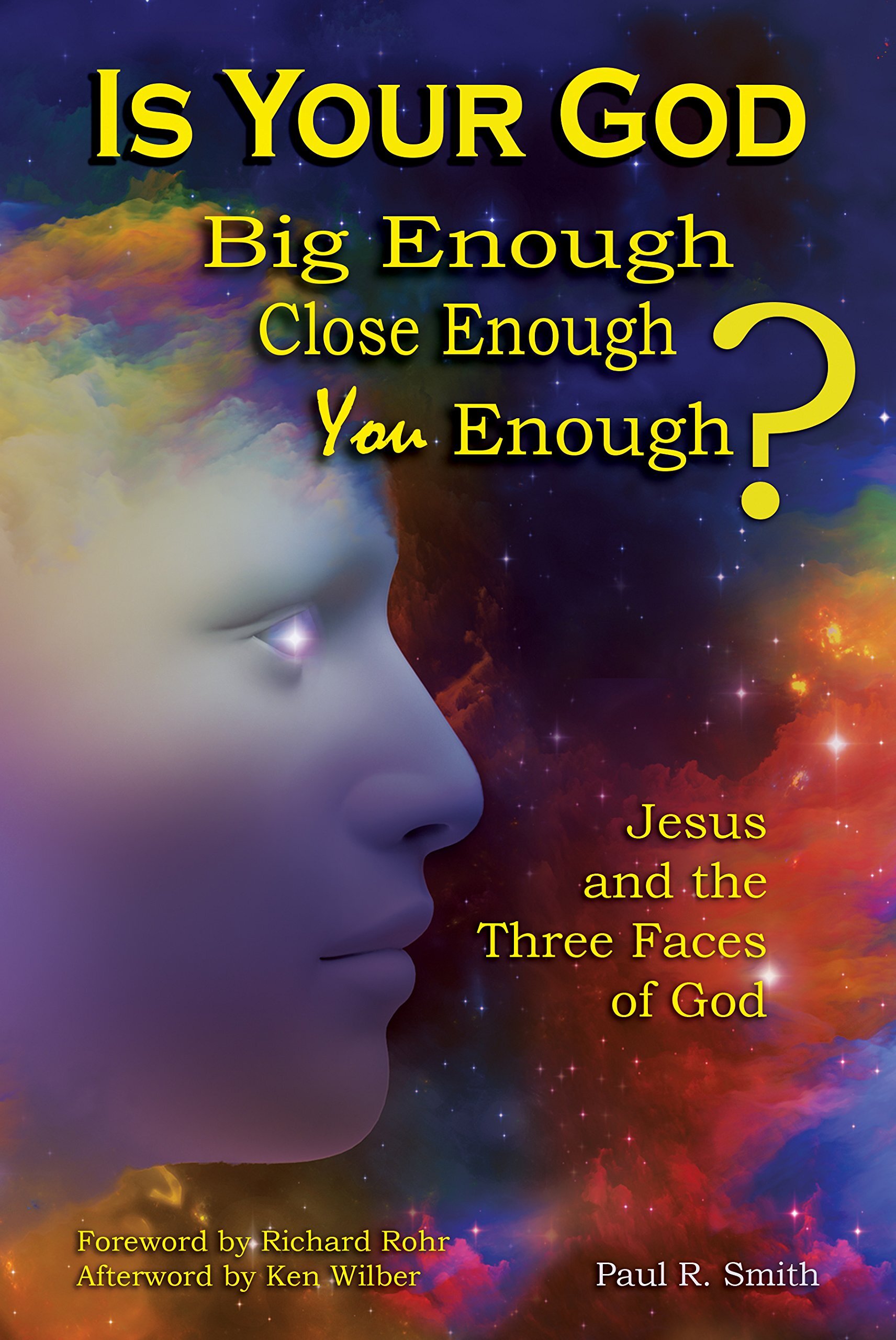WeSpace & Whole-Body Mystical Awakening — 2nd Edition!
by Paul Smith & Luke Healy
This foundational ebook is an introduction to the core elements of Integral Christian Network.
An updated, second edition is now available! This incorporates the evolving process over the first five years of ICN and the practical, on the ground work and experience of hundreds in WeSpace and other groups & practices in this community and beyond.
Integral Christianity: The Spirit’s Call to Evolve and Is Your God Big Enough? Close Enough? You Enough? Jesus and the Three Faces of God form the initial biblical, theological, and philosophical basis for this network. If you find yourself at home with these two books, this may be a place for you and we welcome you to be a part of it.
BELOW ARE OTHER resources AND BOOKS for furthering the evolution of Integral Christianity:
For the most up-to-date resources about Integral Christianity and this network, see our weekly writing series.
Integral Christianity
by Paul Smith
This book presents a model of Christianity that incorporates the insights of a Jesus-centered theology of biblical interpretation, integral philosophy, and over fifty years of pastoral experience in leading evolutionary change in the local church. The perspectives of integral theory and practice, articulated by Ken Wilber, help uncover the integral approach that Jesus advocated and demonstrated in the metaphors of his time and that traditional Christianity has largely been unable to see.
Smith incorporates elements of traditional, modern, and postmodern theological viewpoints, including progressive, New Thought, and emerging/emergent ones. However, he goes beyond all of them and moves to a Christianity that is devoted to following both the historical Jesus and the Risen Christ whose Spirit beckons to us from the future. Smith says, "The oldest thing you can say about God is that God is always doing something new. Jesus pushed his own religion to newness by including the best of its past, and transcending the worst of its present. He calls us to do the same, whatever our religion is today."
Is Your God Big Enough Close Enough You Enough?
By Paul Smith
This book presents a new framework for knowing the God of Jesus Christ. It reveals, in biblical, experiential, and contemporary terms, the Three Faces of God. These three dimensions of God uncover the bigger, closer, and more human God than many commonly understand and experience. These have long been hidden behind the traditional words and images of the “Father, Son, and Spirit” of the Trinity.
Others have presented parts of this path, or one or two Faces of God, but no widely recognized Christian group has yet fully integrated all Three Faces of God. Most denominations, churches, and Christians hold to one or two of these and dismiss the other. Most disagreement among Christian groups are over these three dimensions, arguing for one or two and against the other.
The three-dimensional God that Jesus demonstrated is God-beyond-us, God-beside-us, and God-being-us. This last one is least understood in the West. It is, in part, Spirit within, which is best understood biblically as divine-human consciousness in all its modes.
This is a God who is big enough for our minds, close enough for our hearts, and us enough for, and as, our deepest identity.
Cohering the Integral We Space
Coming from many varieties of experiences, this book provides a range of WeSpace approaches and perspectives. It is a great resource for anyone looking to learn more about WE practice.
Book Description:
This anthology has been designed as a resource for advancing new perspectives, practices and knowledge of the we-space as a group process that brings about distinct forms of individual and social transformation. On the whole, the practices of each we-space lineage engage and co-create our lives from a place of depth and real meeting. This brings forth new insight and collective forms of intelligence that are making new inroads into understanding what it means to come together and participate in the co- creation of our lives, reality and culture. May the emerging wisdom you discover between these pages serve your collective work and practice and benefit others for generations to come.
The Ever-Present Origin
by Jean Gebser
A core text of foundational Integral themes and ideas, this illuminating vision of the upspringing integral consciousness greatly informs our philosophical and integral approach at ICN.
Book Description:
Writing in the midcentury during a period of intense cultural transformation and crisis in Europe, Gebser intuited a series of mutational leaps in the history of human consciousness, the latest of which emerging was the “integral” structure, marked by the presence of time-freedom. Gebser’s insights on the phenomenology of human consciousness has brought profound intellectual depth and spiritual transmission to the field of integral philosophy and consciousness studies, influencing the works of American historians such as William Irwin Thompson and the philosopher Ken Wilber. Further syncretic corroboration links Gebser’s integral age to those of the Indian revolutionary and yogi Sri Aurobindo’s “integral yoga” and Pierre Teilhard de Chardin’s evolutionary mysticism. As William Irwin Thompson writes, “Gebser was a brilliantly intuitive mystic with a profound understanding of poetry and art,” and that The Ever-Present Origin is, “the kind of book that changed one’s life.”
Participation and the Mystery
by Jorge Ferrer
An academic and research based approach from the realm of transpersonal psychology that greatly informs our methodology and practice.
Book Description:
A groundbreaking and hopeful new look at contemporary spirituality, transpersonal psychology, integral education, and religious diversity and pluralism.
Participation and the Mystery is both an introduction to and expansion of Jorge N. Ferrer’s groundbreaking work on participatory spirituality, which holds that human beings are active cocreators of spiritual phenomena, worlds, and even ultimates. After examining the impact of his work since the publication of Revisioning Transpersonal Theory, Ferrer discusses the relationship between science and transpersonal psychology, the nature of a fully embodied spirituality, and the features of integral spiritual practice. The book also introduces a participatory philosophy of education and applies it to the academic teaching of mysticism and a novel approach to embodied spiritual inquiry. Critically engaging the influential work of Stanislav Grof, Ken Wilber, and A. H. Almaas, Ferrer concludes with an original solution to the problem of religious pluralism that affirms the ontological richness of religious worlds while avoiding the extremes of perennialism and contextualism, offering a hopeful vision for the future of world religion. Participation and the Mystery is an invaluable resource to anyone seeking to deepen their understanding of participatory approaches to transpersonal psychology, integral and contemplative education, contemporary spirituality, and religious studies.
The Religion of Tomorrow
by Ken Wilber
This is the best summary and consolidation of Wilber’s work as it relates to the evolution of religion for the future. While dense and at times repetitive, many sections are well worth exploring for the valuable integral insights to inform our creative expressions of loving evolution for Christianity.
Book Description:
A single purpose lies at the heart of all the great religious traditions: awakening to the astonishing reality of the true nature of ourselves and the universe. At the same time, through centuries of cultural accretion and focus on myth and ritual as ends in themselves, this core insight has become obscured. Here Ken Wilber provides a path for reenvisioning a religion of the future that acknowledges the evolution of humanity in every realm while remaining faithful to that original spiritual vision. For the traditions to attract modern men and women, Wilber asserts, they must incorporate the extraordinary number of scientific truths learned about human nature in just the past hundred years—for example, about the mind and brain, emotions, and the growth of consciousness—that the ancients were simply unaware of and thus were unable to include in their meditative systems. Taking Buddhism as an example, Wilber demonstrates how his comprehensive Integral Approach—which is already being applied to several world religions by some of their adherents—can avert a “cultural disaster of unparalleled proportions”: the utter neglect of the glorious upper reaches of human potential by the materialistic postmodern worldview. Moreover, he shows how we can apply this approach to our own spiritual practice. This, his most sweeping work since Sex, Ecology, Spirituality, is a thrilling call for wholeness, inclusiveness, and unity in the religions of tomorrow.






